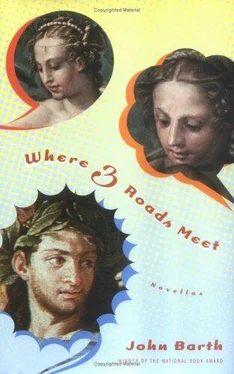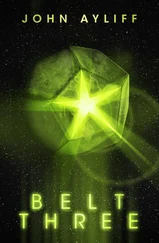We did indeed. But let's be clear on that editing bit, Ag: I made comments and suggestions aplenty, some of which he picked up on and others not. But the critics who've claimed or implied that I as much as coauthored Manny's books—
"Not to mention at least one who'd like to believe that you ghostwrote 'em for him—"
— have their critical heads up their professorial asses, and that's the end of that.
But not the end of your story. Our story.
Not quite its end, but its end's beginning. Let Listener be reminded that the Fates novels came out at three-year intervals, commencing with Clotho in '57 and Lachesis in '60—both from a small, notorious English-language press in Paris that specialized in Seriously Naughty Lit — before the complete trilogy was published with much fanfare by a New York trade house in November 1963. The coincidence of its appear- ance and President Kennedy's assassination was a factor in The Fates' becoming one more icon of the Johnson/Nixon/ Vietnam War high sixties in rock-and-roll America, along with sit-ins and love-ins, sideburns and ponytails, bongs and bell-bottoms and the rest. But even before Atropos was in print, Clotho and Lachesis had gotten their author hounded out of academia as a pornographer and divorced by his wife, who moved cross-country with ten-year-old Junior and holed up somewhere out in Oregon. Poor Manny — hailed in some quarters, condemned or merely dismissed in others — ended our seven-year working relationship with not much more than a shrug and a thank-you-ma'am. He holed up in a mountain cabin back in his native western Maryland and commenced his descent into alcohol, drugs, and cranky hermithood like some combination of Jack Kerouac and J. D. Salinger, rumored to be still writing, though no longer publishing, until his mysterious disappearance "out west" at the decade's end.
Which we'll return to, folks — having established, we trust, that while the capital-E Erotic was our "Fred"'s characteristic mode, medium, and material, it was seldom his real subject. The guy was no prude, but that old Lambda Upsy-daisy of ours was a notable exception to a sexually restrained, contentedly monogamous life.
"Poor shmuck — and that's enough about that. Gracie?"
Poor dear shmuck. So he kisses me goodbye in the winter of '62/'63—modestly, mind you, on the forehead — and thanks me for all my help. For which he'd been paying me ten percent of his meager royalties, I should've said earlier: another little secret I kept from my husband, like my notebooks on our collaboration. Then, when the American edition of the trilogy brought in some serious money, Manny's ex claimed most of it as back alimony and child support, and he signed it over to her.
"Shmuck shmendrick shlimazl!"
It's who he was, Thelma, for better or worse.
Following which, he disappears in an alcoholic haze out west…
With Elvis-like reports of his being spotted in San Francisco's Haight-Ashbury or some hippie commune in Santa Fe or on the road with Ken Kesey's Merry Pranksters. No trace of further manuscripts in the abandoned cabin, but now and then some lit mag would come out with a Dicksonish piece that it claimed had been sent in under Manny's name from Taos or Tijuana, but with no cover note or street address, and which the critics would then debate the authenticity of. Likewise the occasional fragments and even a couple of whole story scripts that someone would claim to've turned up in a desk drawer at Arundel State or Mason-Dixon U. — a gimmick that Cindy makes good use of in her Wye novella. I could've identified his handwriting right off, but those scripts were always typed (not by me), so who knows? Some of the ones I saw in print sounded less unlikely to me than others — but by the time they surfaced, in the early 1970s, I was busy with my own troubles.
Weren't we all. But yours first, Grace: the non-Cindy-Ella version.
Listener needs to be reminded that when Manny first relocated me back in '55 and asked for my "input" on his project-in-the-works, I didn't mention it to my husband for fear he'd find out how his wife had paid her way through college. When our reconnection grew into a regular working relationship, my line with Ned and our kids was that I'd always secretly aspired to write a novel, and was determined to give it a try in what little time a prep school wife and mother can spare from her main responsibilities. And they were great about leaving Mommy undisturbed when she was typing away in her study or "doing her homework" in the Severn Day or Arundel State libraries. During most of those seven years I was seldom actually with Manny for more than an hour maybe once a week, when either I'd meet him on campus at ASC to pick up his latest batch of scribbling and go through my annotated typescript from the week before, or he'd stop by the faculty mailroom at Severn Day after he'd shifted up to MDU. In the Atropos period, after he'd been sacked by the university but before he holed up in the Allegheny hills, we'd have our little conferences in an Annapolis restaurant booth. And maybe half a dozen times, I admit, I met him in some motel or other where he was camping after his wife threw him out, or just staying over to get some research done.
"Some research…"
Okay, I know what Listener's thinking — same as Ned did when he found my diaries. And I grant it sounds like we were going at it. But as Cindy makes clear in her story, it was really more like modeling for life drawing classes in art school. If Manny's mock — Mythic Hero "Fred," for instance (the male lead in the Fates novels, as in Wye), is having himself an early-midlife crisis — as he does in Atropos after dodging the Korean War draft and realizing that he and his wife are evolving in different directions — and one of his colleagues' wives happens to hit on him, and he's reminded of some crazy sex he had back in college days with a girl who looked like a younger version of this one, and Manny needs to describe exactly how Fred feels being in a motel room at age forty with a thirty-year-old married woman naked on all fours, and worrying that he might not get it up for her because of the novelty of it all, dot dot dot? But I swear on Bill Clinton's testicles that I never had sex with that man: I merely might as well have, since I told my damn diary all about us, chapter and verse.
No comment.
"Ditto — except what if Mister Manny needed to know exactly how it felt to Mister Fred there to ball the lady's brains out?"
No comment. What I want to get said is that after '62, when the Dickson-Mason connection was history, it was a real relief for me to abandon my make-pretend writing ambitions and get back to full-time wifing, mothering, and school-teaching. I loved Ned Forester, damn it, different as we were in too many ways. And our kids meant the world to me.
I beg to disagree with that "make-pretend": Not only did you teach literature and composition for a living, and fill umpteen diaries with your take on everything from losing your cherry at age sixteen to posing bare-assed for Manfred Dickson in a Howard Johnson motel room at age thirty; you also "edited," quote/unquote, every page he wrote for seven years! Thelma and I supplied him with a certain amount of information—
"Not to mention a few demos here and there—"
But you were muse and editor rolled into one.
"So to speak."
So okay, you didn't write Manny's books. But The Fates would never have gotten themselves written without you.
For better or worse, thanks, depending on where you're coming from. Junior himself half wishes he could prove I wrote them, we half suspect, so he could shoot down his big bad daddy's main claim to fame — except that there would go his only fame-claim, too. But my diaries made it clear which of us was the novelist and which the typist/editor, as does dear Cindy's Wye.
Читать дальше












